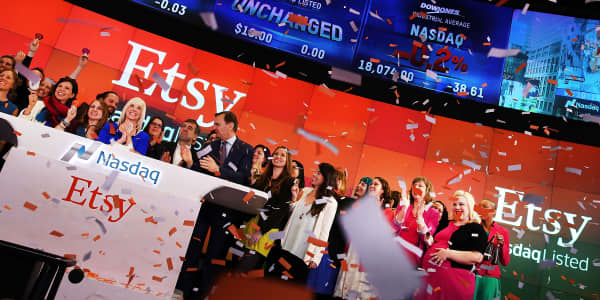The latest news on the CNBC Disruptor 50 companies upending the status quo in the markets:
Rebel yell
For many years, The Beatles resisted making their catalog available on iTunes, but the times eventually changed, even for Paul McCartney. In fact, Sir Paul's much-misunderstood and recently re-released '70s album "Ram" went straight to Spotify, and his new album, "New," is also available on the streaming music service. Likewise, geriatric grunge rockers Pearl Jam's new album, "Lightening Bolt," was on Spotify from Day One. Are the elder statesmen of rock warming to Spotify? Depends which old man you ask.
Thom Yorke of Radiohead hasn't minced his words. He can't seem to stop finding new words and metaphors to show his dislike. Now Yorke has some company, another rebel yell from an anti-Spotify talking head from rock's old guard: Talking Heads frontman David Byrne. Apparently, the streaming music service stopped making sense to him, because like Yorke, Byrne has pulled as much of his catalog as possible from Spotify and wrote in a Guardian opinion piece: "The Internet will suck all creative content out of the world."
But Byrne didn't get the last word: 57-year-old frontman for seminal post-punk rock band Gang of Four, David Allen, got The Guardian to allow him to gang up on Byrne and Yorke and write a piece on why they are wrong.
(Read more: 11 ways your daily routine will change)
Save the short-term renters!
We reported last week on New York Attorney General Eric Schneiderman's attempt to subpoena the entire world ... of Airbnb hosts in New York, roughly 15,000 people. Airbnb didn't like that, and didn't wait long to put the power of the sharing economy to work, with a petition going out from a New York-based Airbnb-er, Mishelle, to take down the AG.
The company lent its support to the petition: Airbnb's New York users got an email from the company asking them to "make your voice heard." The Gothamist suggested that the Airbnb petition was a clever ruse of the company's creation, but Mishelle promised to personally deliver the petition to Albany if it got 20,000 signatures. It had more than 21,000. The conflict gives new meaning to the age-old battle between landlords and tenants. But some argue, like Jim Epstein in The Daily Beast, that the NY AG's legal maneuvering is a "petty war."
But it's going to be OK if Airbnb is shut down by the status quo regulatory regime: a new rental service, Tansler, tells Forbes it's got a better model anyway, based on a public auction model.
The four-hour theory of Kickstarter
Kickstarter is a huge success, but in the same way that a baseball player who gets a hit one every three times at bat is an all-star. A majority of Kickstarter projects fail. In fact, a new study finds that you can tell if a Kickstarter project will make it within four hours of launch.
Researchers at the Swiss Federal Institute of Technology in Lausanne decided to give Kickstarter project starters a hand by seeing if they could predict the likelihood of success. Their new algorithm claims to predict the ultimate success or failure of a fundraising attempt with 76 percent accuracy within four hours of a campaign launching. The researchers based their findings on a nine-month study of some 16,000 Kickstarters, according to a report on Mashable.
(Read more: Can a drone find Bigfoot?)
The Kabam effect?
Free-to-play video game maker Kabam is talking about an IPO, and no surprise, its business model is working, especially on mobile devices. But here's another sign—maybe a better one than one more start-up CEO talking vaguely about an IPO—that speaks to the free-to-play success. Once seen as warring factions within the $66 billion video game industry, advocates of the traditional console and free-to-play games are striking an unlikely alliance to reach out to new players in each other's camps, The Wall Street Journal reported. "It's only a matter of time before free-to-play gets big on the console," David Reid, chief marketing officer at CCP Games, told the WSJ in an email.
Shaving the head of a future billionaire
When you think of billionaire start-up CEOs, thoughts don't usually run down under to Australia, but Atlassian, the enterprise software darling of kangaroo country, is among tech start-ups expected to test the public markets some time soon, making a fortune for its co-founder and CEO Scott Farquhar. The Atlassian CEO, though, is currently more interested in raising money for others. It's the time of year for Movemeber, when men worldwide grow mustaches to raise money and awareness for men's health issues like prostate cancer. Farquhar decided this was a mission his company needed to embrace, as Movember began in Sydney.
Yet as Business Insider reports, Australia's geeks were not rushing to add facial hair (possibly because much of Atlassian's staff is too young to do so) when Movember arrived last year. So the firm's CEO took another approach: "The fundraising wasn't going well," Farquhar told Business Insider. "If we raise $20,000, I'll shave my head at the end of Movember. If we raise $30,000 I'll wear a mohawk and if we raise $40,000, I'll wear a blue mohawk." They raised $43,000, and on Dec. 1, the whole company gathered around to watch Farquhar get his head shaved and dyed. That night, he had a meeting with the country's prime minister.
As Movember approached again, it could be time for Mark Zuckerberg and Dick Costolo to consider new hairdos.
(Read more: No one can really make Edison's light bulb disappear)
Buy yourself a gift, then 3-D print everyone else's
3-D printing company Makerbot announced some new stores in Boston and Greenwich, Conn., just in time for holiday season. So go ahead, buy yourself a gift—a 3-D printer—and then print gifts for everyone else.

23andMe and YOU
The recent hysteria over a patent awarded to genetics testing company 23andMe for "designer babies" has led the company to deal upfront with a serious issue: it's public perception. Even though the company said it never had any intention of using the patent, 23andMe co-founder and CEO (and wife of Google founder Sergey Brin) Anne Wojcicki, told Fast Company in a November cover story, "We have to experiment. I think back on the marketing of something like TiVo. They were so lucky! Real time TV any time you want it, just save it. Everyone understands that concept. But when you tell people 'Hey, get your genetics!' they're like 'Why? What is it?' The learning curve is different."
Uber's collision course
Airbnb's battle with the New York AG may be the biggest on the sharing economy landscape, but this headline from the Florida Times-Union newspaper speaks to a similar tone in the private car sector where Uber is growing its map: "Jacksonville City Council vote could open door for Uber, 'devastate' car-for-hire competitors."
Legislation to let online car service Uber operate in Jacksonville got its first green light on Monday after weeks spent idling in City Council committees. "This opens the floodgates for these types of companies," Grady Braddock Jr., whose family has spent 30 years in the taxi business, told the Council's Transportation, Energy and Utilities Committee. Online companies are "devastating" traditional transportation counterparts, he said.
No surprise, then, that Uber is preparing for battle. It has hired its first D.C. lobbying firm. The Franklin Square Group, which focuses on technology issues, said it will lobby for Uber on "innovation in the transportation marketplace," according to a report in The Hill. Franklin Square also lobbies for Apple, Google, Sprint, Cisco and Square.
(Read more: The booming business of 3-D printing)
Old school banking lends a hand to Lending Club
Lending Club has hired Sid Jajodia, senior vice president of small business lending at Capital One Bank, to spearhead the launch of a small business lending platform planned for 2014. Lending Club's attack on the small business market is targeting an old problem: lack of access to credit for entrepreneurs from the big banks. "Small businesses are driving both economic growth and job creation, yet are struggling to access capital," Lending Club CEO Renaud Laplanche said in a statement announcing the hire.
Shutdown psychology
Nothing to do during the recent government shutdown? May as well waste time on your mobile. In fact, Foursquare released a study this past week of what its "location-based" app learned about shutdown habits. "During the first week of the shutdown, the number of check-ins remained normal, but instead of offices, trains, and cafeterias, people were going to bars and Italian restaurants. People seemingly treated the furlough as a vacation, spending even more time in expensive restaurants. But as the shutdown continued into its second week, activity dramatically decreased—as though people stopped viewing the shutdown as a holiday," the company stated in a release picked up by media outlets including The Washington Post.
Finding Bin Laden, finding fine wine
A former Palantir Technologies staffer, Alex Fishman, is applying some of the know-how that helped his former company find Osama bin Laden help wine snobs catalog the globe's vineyards. Delectable is the app from Fishman that applies some of the algorithmic smarts of Palantir's world to the wine enthusiast's market, Business Insider reports.
—By Eric Rosenbaum, CNBC.com





